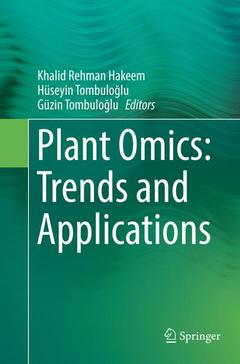Description
Plant Omics: Trends and Applications, Softcover reprint of the original 1st ed. 2016
Coordinators: Hakeem Khalid Rehman, Tombuloğlu Hüseyin, Tombuloğlu Güzin
Language: English
Subjects for Plant Omics: Trends and Applications:
Publication date: 06-2018
Support: Print on demand
Publication date: 08-2016
514 p. · 15.5x23.5 cm · Hardback
Description
/li>Contents
/li>Biography
/li>Comment
/li>
Dr. Khalid Rehman Hakeem (PhD) is working as a Fellow Researcher at the Faculty of Forestry, Universiti Putra Malaysia (UPM), Serdang, Selangor, Malaysia and also a Visiting Professor at Fatih University, Istanbul, Turkey. He has obtained his MSc. (Environmental Botany) as well as PhD (Botany) from Jamia Hamdard, New Delhi, India in 2006 and 2011 respectively. He has conducted his Post Doctorate research in the fields of forest dynamics and plant biotechnological studies from Universiti Putra Malaysia from 2012-2013. Dr. Hakeem has more than Nine years of teaching and research experience in Plant Eco-Physiology, Biotechnology & Molecular biology, Plant-Microbe-soil interactions as well as in Environmental sciences. Recipient of several fellowships at both national and international levels, Dr. Hakeem has so far edited and authored more than sixteen books with International publishers. He has also to his credit more than 70 research publications in peer reviewed international journals, including 30 book chapters with international publishers. He is also the Editorial board member and reviewer of several high impact international Journals. Dr. Hakeem is currently engaged in studying the plant processes at ecophysiological as well as proteomic levels.
Dr. Güzin Tombuloğlu (PhD) is working as a Assistant Professor at the Pathology Laboratory Techniques Programme of Vocational School of Medical Sciences, Fatih University, Istanbul, Turkey. She has received her MSc.(Biology) degree in 2008 and PhD (Biotechnology) degree in 2014 from Fatih University. She has studied transcriptomics identification of barley boron tolerance mechanism during her PhD. She has experienced several projects on abiotic stress, plant stress responses, Boron toxicity and transcriptomics. She has given several courses on teaching biology education for ten years. She also worked as a Chairman in Pathology Laboratory Techniques Programme and AssistantThese books may interest you

OMICS Applications in Crop Science 293.12 €

OMICS Applications in Crop Science 111.58 €


